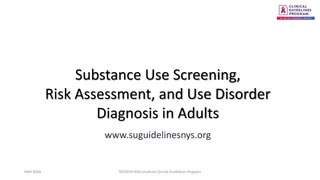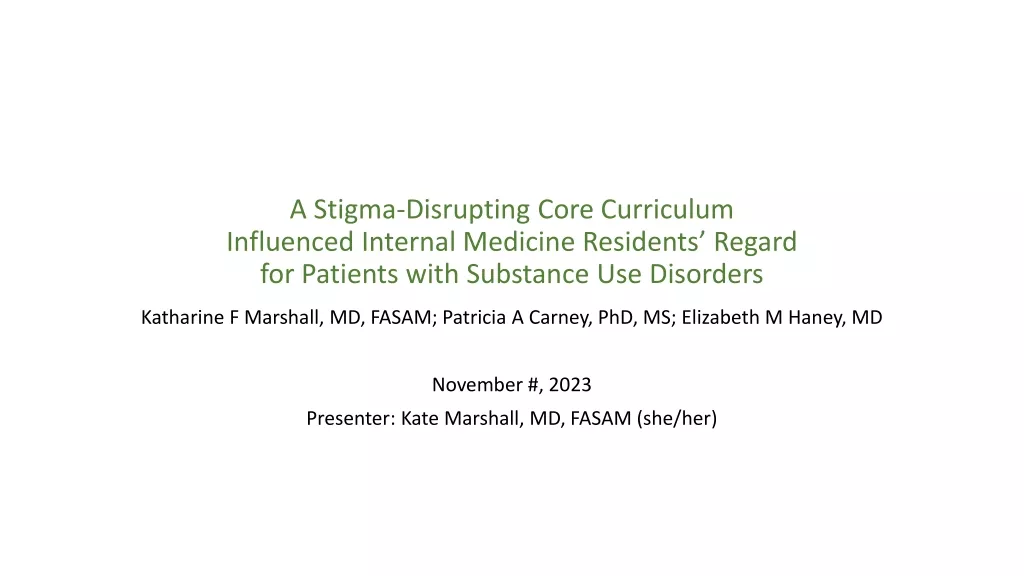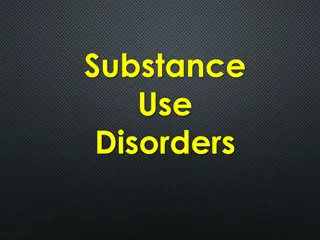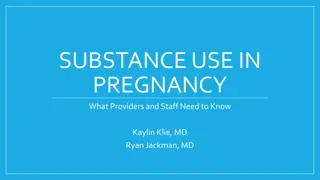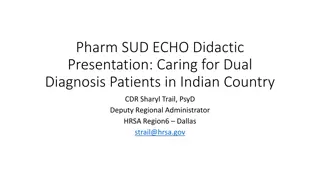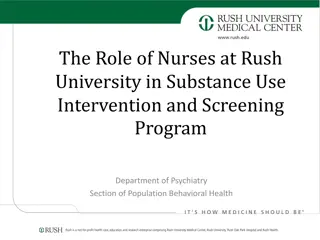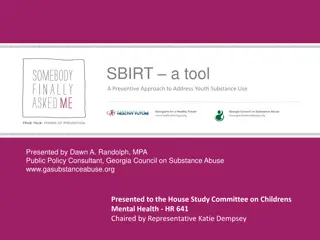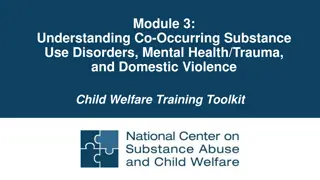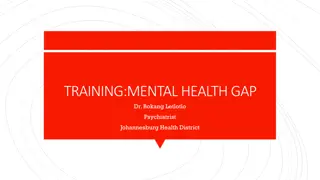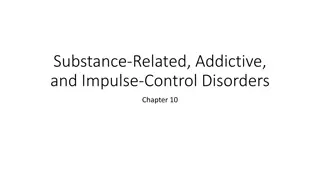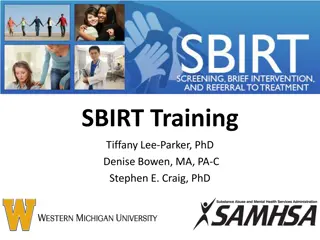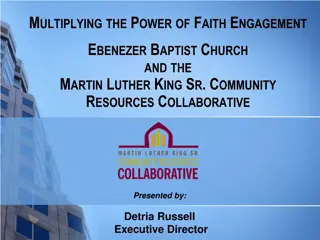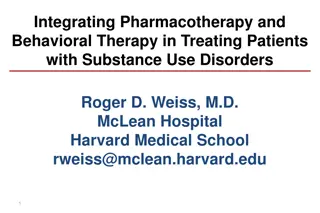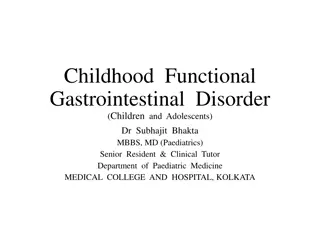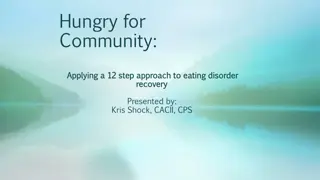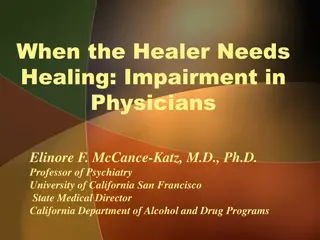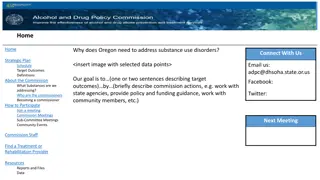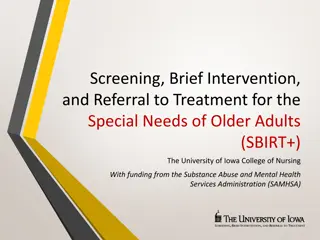Collaborative Approach to Supporting Families Impacted by Substance Use Disorders
Peter Slom, DCYF Substance Use Disorder Liaison, presents a collaborative approach to helping families impacted by substance use disorders. Partnering with Parents Support Network, the program offers assistance, referrals, and support through Certified Peer Recovery Specialists. These specialists help individuals get into treatment and provide ongoing support. The program ensures that all specialists are certified, trained in NARCAN assistance, and supervised to maintain quality standards.
Download Presentation

Please find below an Image/Link to download the presentation.
The content on the website is provided AS IS for your information and personal use only. It may not be sold, licensed, or shared on other websites without obtaining consent from the author. Download presentation by click this link. If you encounter any issues during the download, it is possible that the publisher has removed the file from their server.
E N D
Presentation Transcript
Helping DCYF Helping DCYF Families Impacted Families Impacted with Substance Use with Substance Use Disorders: Disorders: A Collaborative A Collaborative Approach Approach Presented by: Peter Slom LCSW Peter Slom LCSW DCYF Substance Use Disorder Liaison DCYF Substance Use Disorder Liaison
Partner with Parents Support Network Partner with Parents Support Network- - currently using (4) coaches and (1) currently using (4) coaches and (1) supervisor supervisor Assist parents and family members with Assist parents and family members with concerns of Substance Use Disorders (SUD) concerns of Substance Use Disorders (SUD) Referrals may come from Child Protective Referrals may come from Child Protective Services, Family Service Unit, Family Services, Family Service Unit, Family Treatment Drug Court or Juvenile Treatment Drug Court or Juvenile Corrections Corrections Co Co- -located in all DCYF Regions and Family located in all DCYF Regions and Family Treatment Drug Court Treatment Drug Court Certified Certified Peer Peer Recovery Recovery Specialists Specialists (Coaches) (Coaches)
CPRS are made up of current or former CPRS are made up of current or former consumers of behavioral health services consumers of behavioral health services May be in long May be in long- -term recovery from term recovery from substances, mental illness or co substances, mental illness or co- -occurring disorders disorders Provide support and assistance Provide support and assistance Help get individuals into treatment and Help get individuals into treatment and connected to recovery resources connected to recovery resources Certified Certified Peer Peer Recovery Recovery Specialists Specialists (Coaches) (Coaches) occurring continued continued
All CPRS are: All CPRS are: Certified by the RI Certification Board Certified by the RI Certification Board Trained in NARCAN assistance Trained in NARCAN assistance Work supervised by a BHDDH Work supervised by a BHDDH- -approved Peer Recovery Specialist Supervisor Peer Recovery Specialist Supervisor Must have a high school diploma/GED, Must have a high school diploma/GED, 46 hours of relevant education, 500 46 hours of relevant education, 500 hours of volunteer or paid experience hours of volunteer or paid experience specific to the domains. specific to the domains. Certified Certified Peer Peer Recovery Recovery Specialists Specialists (Coaches) (Coaches) approved continued continued
All CPRS should be competent in: All CPRS should be competent in: Guiding principles and aspects of Guiding principles and aspects of recovery recovery Relationship building, communication Relationship building, communication skills skills Cultural competence in recovery support Cultural competence in recovery support Boundaries and ethical issues Boundaries and ethical issues Trauma Trauma- -informed approaches informed approaches Recovery and wellness planning Recovery and wellness planning Certified Certified Peer Peer Recovery Recovery Specialists Specialists (Coaches) (Coaches) continued continued
DCYF is working in partnership with RIDOH, Women & Infants. and community providers to coordinate support during pregnancy and immediately post-partum. Pregnancy/ Pregnancy/ Hospital Hospital Alerts Alerts DCYF tracks cases coming into the CPS Hotline (1 1- -800 800- -RI RI- -CHILD CHILD) expressing concerns about an unborn child.
DCYFs SUD Liaison reaches out to pregnant mothers to offer services and assistance, including the use of CPRS and help them access SUD treatment. Pregnancy/ Pregnancy/ Hospital Hospital Alerts Alerts Helps to reduce safety threats and the need to intervene and/or remove the child at the time of birth. Engage parents in services to begin the process of creating a safe environment for reunification if the child is removed at delivery.
Multi-disciplinary conference call Tuesday and Friday mornings Includes DCYF, RIDOH, First Connections, and Recovery Coach Review all newborns at Women and Infants who are NAS or SEN including any cases subject to DCYF investigation Team discusses family functioning, any safety threats, and possible forms of assistance Follow-up with DCYF worker to help with safety decisions DCYF/RIDOH/First Connections DCYF/RIDOH/First Connections NAS Case Conferences NAS Case Conferences
Fatherhood Initiative Fatherhood Initiative Help fathers who want to be part of their children s lives Provide support and resources for fathers To help every child to grow up with an involved, responsible, and committed father Coordinated through the Parents Support Network and DCYF Meet in Warwick the 1st and 3rd Wednesday of the month Expanded to meet in Pawtucket, Newport and Westerly twice a month Guest presenters from Family Court, DCYF and other community providers
Community Services and Behavioral Health (CSBH) unit partners with the Family Court to provide services which were previously only accessible to families open to DCYF Keeps families out of DCYF and prevent future court involvement Utilize programs including Family Care Community Partnerships (FCCPs) Diversion from Family Court Diversion from Family Court
DCYF Service DCYF Service Response Response Teams Teams Collaboration among different divisions of DCYF to review complex cases Ensures that the placements in and out of the home are most appropriate and best supported by community-based services Teams will meet on a daily basis to provide consultation for new cases as well as existing ones and those being diverted to community prevention
DCYF collaborating with Central Falls Schools, Tides Family Services, Community for People, and other Central Falls community partners Targeting high-risk families and providing access to immediate, culturally-relevant supports to ensure positive outcomes for all children Goal is to foster prevention, reduce child maltreatment, reduce psychiatric hospitalizations and encourage school success Central Falls Community Investment Team Central Falls Community Investment Team
SAFE Practice Model SAFE Practice Model Family Functioning Assessment (FFA) Family Functioning Assessment (FFA) Ongoing Family Functioning Assessment (OFFA) Ongoing Family Functioning Assessment (OFFA) Launched through CPS, FSU and Juvenile Corrections on November 13, 2019 Establish a consistent practice model across all DCYF divisions Create standardized and accurate safety determinations throughout a child and family s involvement with DCYF


